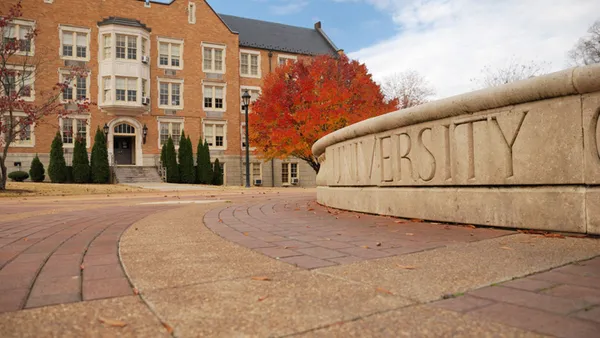Dive Brief:
- Almost 300 people who have accounts at the Teachers Insurance and Annuities Association, TIAA — nearly all of them professors, scientists and academics — have submitted a complaint against the retirement giant for its investments in fossil fuels and deforestation.
- The complaint, filed with the United Nations-sponsored Principles for Responsible Investment, calls on TIAA to issue a moratorium on new fossil fuel investments and divest from such holdings by 2025, along with other measures, or else be removed as a signatory from the PRI.
- Faculty members say they are emboldened to act against climate change and see the effort as connected to activism that's unfolded across higher education at the institutional level.
Dive Insight:
An organization behind the complaint, TIAA-Divest, alleges that the financial firm holds $78 billion in fossil fuel investments.
“What’s really important about these numbers is that they are high relative to their peers,” said Molly Ornati, an organizer with TIAA-Divest, presenting on the campaign at the Institute for Energy Economics and Financial Analysis conference in New York.
One of TIAA's arms, Nuveen, has signed onto the Principles of Responsible Investment. PRI requires signatories to incorporate environmental, social and governance factors into investment analysis and decision-making processes. Academics who have joined the complaint include prominent scholars such as Noam Chomsky and Judith Butler.
“TIAA is taking our money that we earned and using it to support companies that are making the planet unliveable,” said Jedediah Brodie, a signatory to the complaint and chair of conservation at the University of Montana.
The University of Montana’s faculty senate in 2021 passed a resolution demanding that TIAA withdraw from its fossil fuel investments. TIAA-Divest says there have been 11 such faculty senate resolutions across the country, as well as a vote of support from the American Federation of Teachers.
Caroline Levine, a professor of humanities at Cornell University and organizer with the campaign, said she personally does not want institutions to drop TIAA as their retirement firm, but to stay with the company and add pressure.
For some faculty members involved in the complaint, the campaign is an outgrowth of activism targeting institutional endowments. Levine was previously involved in advocacy targeting Cornell’s endowment. In 2020, the university pledged not to make new private investments focused on fossil fuels. Levine said faculty enthusiasm is growing, and professors are partnering with students in the movement.
“Once you understand how money and financing are underwriting the fossil fuel economy, it makes sense to move from one to the other,” she said.
Paul Lachapelle, a political science professor at Montana State University, said further faculty involvement in the divestment movement may help push colleges and universities to consider the divest movement's demands.
“Faculty are kind of the main cog in the machine,” said Lachapelle, who has a background in forestry. “As an educator, it’s incumbent to walk the talk.”
Lachapelle said he signed on to the TIAA complaint after finding faculty at his own institution too worried about the threat of legislative cuts from the state’s Republican-held chambers to advocate for divestment.
A TIAA spokesperson said the company believes it is in compliance with the PRI and has met with the organization to provide information and context.
“TIAA is committed to managing investments in line with a transition to a low-carbon economy. However, after due consideration, our view is that broad divestment from fossil fuels does not offer TIAA an optimal way to influence the policies and practices of issuers we invest in, nor is it the best means to produce long-term value for our investors and other stakeholders,” the spokesperson said via email. “Large-scale divestments by simply selling fossil-fuel-generating investments to other companies won’t reduce carbon output. We want to work toward overall solutions.”














